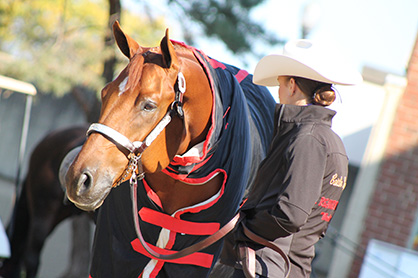Study Shows Horses Can Indicate Their Preference For Wearing a Blanket or Not
By: Mark Andrews
Researchers in Norway have managed to get horses to indicate their preference for wearing or not wearing a blanket. The results are published in Applied Animal Behaviour Science.
The research was led by Dr Cecilie Mejdell of the Norwegian Veterinary Institute. Twenty-three horses, of various breeds, took part in the study.
First, each horse was trained to approach a board hung on a fence and touch it with its muzzle. Then, it was taught to tell the difference between different symbols – blanket on (horizontal bar), blanket off (vertical bar) and no change (blank). This was done by showing the horses specific symbols and then immediately carrying out the action represented by the symbol (such as removing a blanket).
It took 2 weeks, with training sessions lasting 10-15 minutes a day, for the horses to learn how to signal if they were too hot or too cold, by going up to the board and asking for the rug to be put on or taken off.
Once the horses knew what each symbol would help them achieve, they gave the horses a blanketing choice in different weather conditions. They found that all horses in the study chose to not wear a blanket when the weather was sunny, but they preferred to have a blanket put on when it was wet, windy and cold.
“The horses used their new insight to communicate their preference regarding blanketing in order to obtain or maintain thermal comfort, based on their individual perception of weather including ambient temperature, wind and precipitation,” write the authors of the paper. “Results strongly indicate that touches represented actual preferences.”
The researchers suggest that their method could be used to ask horses other questions.











